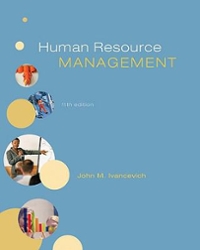Nearly every businessperson over 30 has done it: sat in his office after a staff meeting and-reflecting
Question:
Nearly every businessperson over 30 has done it: sat in his office after a staff meeting and-reflecting upon the 25-year-old colleague with two tattoos, a piercing, no watch and a shameless propensity for chatting up the boss-wondered, What is with that guy! At once a hipster and a climber, he is all nonchalance and expectation. He is new, he is annoying, and he and his female counterparts are invading corporate offices across America. Generation Y: Its members are different in many respects, from their upbringing to their politics. But it might be their effect on the workplace that makes them truly noteworthy- more so than other generations of twentysomethings that writers have been collectively profiling since time immemorial. They're ambitious, they're demanding, and they question everything, so if there isn't a good reason for that long commute or late night, don't expect them to do it. When it comes to loyalty, the companies they work for are last on their list-behind their families, their friends, their communities, their co-workers and, of course, themselves. But there are a whole lot of them. And as the baby-boomers begin to retire, triggering a ballyhooed worker shortage, businesses are realizing that they may have no choice but to accommodate these curious Gen Y creatures. Especially because if they don't, the creatures will simply go home to their parents, who in all likelihood will welcome them back. Some 64 million skilled workers will be able to retire by the end of this decade, according to the Conference Board, and companies will need to go the extra mile to replace them, even if it means putting up with some outsized expectations. There is a precedent for this: In April 1969, Fortune wrote, "Because the demand for their services so greatly exceeds the supply, young graduates are in a strong position to dictate terms to their prospective employers. Young employees are demanding that they be given productive tasks to do from the first day of work, and that the people they work for notice and react to their performance."
Questions
1. What will organizations have to do to adapt to the influx of needed Generation Y individuals?
2. Is Generation Y really that different than previous generations that entered the workforce in large numbers? Explain.
3. Will Generation Y individuals have to make adjustments in their style, preferences, and interests to be successful in their careers?
Step by Step Answer:






